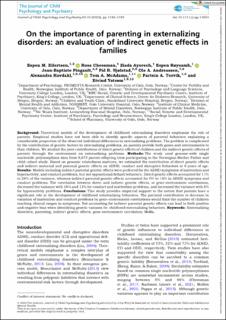On the importance of parenting in externalizing disorders: an evaluation of indirect genetic effects in families
Eilertsen, Espen Moen; Gillespie Cheesman, Rosa Catherine; Ayorech, Ziada; Røysamb, Espen; Pingault, Jean-Baptiste; Njølstad, Pål Rasmus; Andreassen, Ole; Havdahl, Alexandra Karoline Saasen; McAdams, Tom A.; Torvik, Fartein Ask; Ystrøm, Eivind
Journal article, Peer reviewed
Published version

Åpne
Permanent lenke
https://hdl.handle.net/11250/3028414Utgivelsesdato
2022Metadata
Vis full innførselSamlinger
- Department of Clinical Science [2295]
- Registrations from Cristin [9489]
Originalversjon
Journal of Child Psychology and Psychiatry. 2022, 63 (10), 1186-1195. 10.1111/jcpp.13654Sammendrag
Background: Theoretical models of the development of childhood externalizing disorders emphasize the role of parents. Empirical studies have not been able to identify specific aspects of parental behaviors explaining a considerable proportion of the observed individual differences in externalizing problems. The problem is complicated by the contribution of genetic factors to externalizing problems, as parents provide both genes and environments to their children. We studied the joint contributions of direct genetic effects of children and the indirect genetic effects of parents through the environment on externalizing problems.
Methods: The study used genome-wide single nucleotide polymorphism data from 9,675 parent–offspring trios participating in the Norwegian Mother Father and child cohort study. Based on genomic relatedness matrices, we estimated the contribution of direct genetic effects and indirect maternal and paternal genetic effects on ADHD, conduct and disruptive behaviors at 8 years of age.
Results: Models including indirect parental genetic effects were preferred for the ADHD symptoms of inattention and hyperactivity, and conduct problems, but not oppositional defiant behaviors. Direct genetic effects accounted for 11% to 24% of the variance, whereas indirect parental genetic effects accounted for 0% to 16% in ADHD symptoms and conduct problems. The correlation between direct and indirect genetic effects, or gene–environment correlations, decreased the variance with 16% and 13% for conduct and inattention problems, and increased the variance with 6% for hyperactivity problems.
Conclusions: This study provides empirical support to the notion that parents have a significant role in the development of childhood externalizing behaviors. The parental contribution to decrease in variation of inattention and conduct problems by gene–environment correlations would limit the number of children reaching clinical ranges in symptoms. Not accounting for indirect parental genetic effects can lead to both positive and negative bias when identifying genetic variants for childhood externalizing behaviors.
